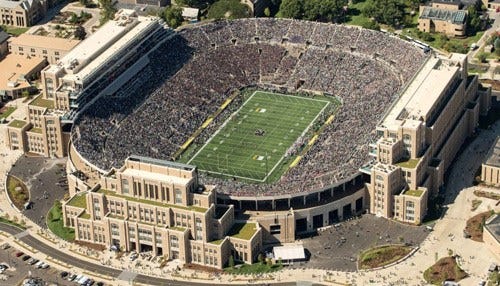NCAA Upholds Decision to Vacate Notre Dame Football Wins
 (Image courtesy of the University of Notre Dame.)
(Image courtesy of the University of Notre Dame.)
Subscriber Benefit
As a subscriber you can listen to articles at work, in the car, or while you work out. Subscribe NowAn NCAA appeals committee has upheld a previous ruling forcing the University of Notre Dame football team to vacate wins from the 2012-13 and 2013-14 seasons due to ineligible athletes. The NCAA Division I Infractions Committee made the original decision in November 2016 after finding a former Notre Dame athletic training student committed academic misconduct on behalf of several football players.
The panel found the student wrote papers for some football players, which made the football players ineligible. Notre Dame appealed the ruling and argued the appeals committee should not have vacated the records since the panel did not consider the university’s role in addressing academic matters. The university also argued the penalty was excessive since the university was not aware of the academic conduct.
In a statement Tuesday, Notre Dame President John Jenkins said:
We are deeply disappointed by and strongly disagree with the denial of the University’s appeal, announced today by the NCAA, of an earlier decision by the NCAA’s Committee on Infractions to vacate Notre Dame’s 2012 and 2013 football victories due to academic misconduct by several student-athletes. Our concerns go beyond the particulars of our case and the record of two football seasons to the academic autonomy of our institutions, the integrity of college athletics and the ability of the NCAA to achieve its fundamental purpose. I write this letter so that you can understand the underlying facts, the reasons we believe that the NCAA is in error and how we intend to move forward.
Let me be clear that we in no way excuse the very serious instances of academic dishonesty committed by our students. Academic fraud strikes at the very heart of our educational mission and the values of Notre Dame. That is why, when we first became aware that academic misconduct might have occurred, we spared no effort, consistent with the procedures of our Honor Code, to investigate each instance of possible academic misconduct. After an exhaustive investigation that covered four months, significant but appropriate penalties were administered by our Honesty Committee to all students found responsible for academic dishonesty, including the three members of our football team whose conduct underlies the vacation of wins penalty, as well as students involved who were not members of any athletic team.
Notre Dame disagreed with several aspects of the NCAA’s assessment of this case, but in order to conclude the case expeditiously, we agreed to accept certain findings of violations. Two of those violations, involving three student-athletes, carried mandatory penalties, which the University accepted, and the possibility of a vacation of team records, which was at the discretion of the NCAA to impose. It is to the imposition of this discretionary penalty that the University objects and which it appealed.
We are deeply disappointed that the NCAA failed to recognize these critical points. Yet we are committed to work with partner institutions to introduce NCAA legislation that will lead to more reasonable decisions—decisions that will support rather than discourage institutions that do their best to uncover and respond to academic dishonesty in accord with their respective honor codes. We will also do all we can to protect the autonomy of institutions to fashion and follow their honor codes in accord with academic, rather than athletic, considerations. We call on the NCAA administration to work with member institutions to both 1) establish policies and practices that will support member institution efforts to address academic dishonesty and that will delineate the lines between the NCAA’s athletic jurisdiction and the academic autonomy of its member institutions, and 2) reform its enforcement process to provide a level of transparency, consistency, and fairness that it currently lacks. What is at stake here is the academic autonomy of our institutions and the integrity of college athletics. What is at stake is the ability of the NCAA to achieve its basic purpose, “to maintain intercollegiate athletics as an integral part of the educational program and the athlete as an integral part of the student body” (NCAA Constitution, Article 1.3.1).
The Fighting Irish were 12-1 during the 2012 season, and 9-4 in 2013.
